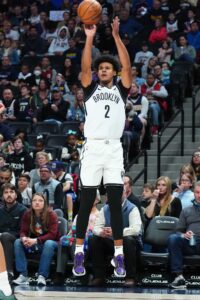The Nets have been rumored as a potential participant in a Damian Lillard trade — either acquiring him directly or helping to facilitate a deal between Portland and Miami — but Mikal Bridges believes the team is done with major offseason moves, writes Brian Lewis of The New York Post.
Speaking at his youth camp, Bridges said the opening night roster is probably more or less set and he’s looking forward to seeing how the team can benefit from stability and what Jacque Vaughn can implement in his first full season as head coach.
“Just excited for him to have a preseason, have his guys he wants around and pretty much have it his way,” Bridges said. “And I’m excited for us to all be together and have these schemes from jump, (instead of) being thrown out there with three different teams in one lineup and just trying to go figure it out. So I’m definitely excited.”
Brooklyn still has some minor decisions to make before training camp, Lewis adds. The team has a two-way slot to fill and it has to decide whether to keep guard David Duke, who is an unrestricted free agent after not receiving a qualifying offer. Lewis notes that the Nets have also received trade interest involving Royce O’Neale and Dorian Finney-Smith.
Bridges is relieved that Brooklyn was able to re-sign forward Cameron Johnson, who has been his close friend since they both entered the league in Phoenix. The Pistons in particular were viewed as a potential destination for Johnson before he agreed to a four-year, $94.5MM deal early in free agency.
“I think Detroit was in talks a lot, and I know (former Suns coach Monty Williams) is over there, so I’m just like, ‘All right now, calm down. Don’t take Twin away,’” Bridges said. “So definitely very, very for the team — outside my selfish reasons, but for the team — big-time. We need Cam. And for him to get paid and kind of get that baby weight off his shoulders, I think it’s great for the team and great for him.”
 “Re-signing Cam was our top priority throughout this free agency period, and we are thrilled to have him remain in Brooklyn as a core member of the Nets for years to come,” Nets general manager Sean Marks said in a statement. “Since the moment he arrived last season, Cam immediately embraced a leadership role both on and off the court. His versatile skillset as a two-way wing has proven to be an ideal fit with our roster, and we look forward to the positive impact he will continue to bring to our team and the Brooklyn community.”
“Re-signing Cam was our top priority throughout this free agency period, and we are thrilled to have him remain in Brooklyn as a core member of the Nets for years to come,” Nets general manager Sean Marks said in a statement. “Since the moment he arrived last season, Cam immediately embraced a leadership role both on and off the court. His versatile skillset as a two-way wing has proven to be an ideal fit with our roster, and we look forward to the positive impact he will continue to bring to our team and the Brooklyn community.”